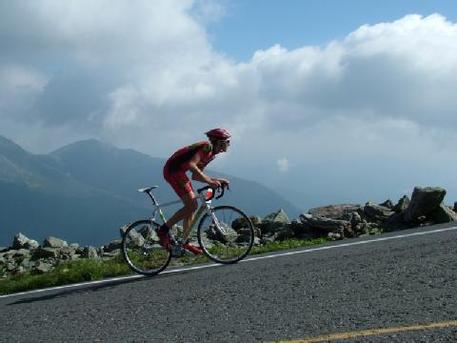As you coast down the other side that potential energy is converted to kinetic energy.
Potential and kinetic energy biker.
Picture yourself riding a bike up a hill resting for a bit and then coasting down the other side.
From there on it is all kinetic energy.
When the bus will reach the bottom of the hill the kinetic energy will become maximum.
The object will turn around where the total energy line and potential energy curve cross.
Energy can neither be created nor it can be destroyed.
Moving objects perform work by imparting movement to other matter.
If you start the object at a different location or with a different initial kinetic energy the total energy line can shift up or down.
There will come a point where the value of both the kinetic energy as well as the potential energy will become the same.
Interconversion of kinetic and potential energy.
Kinetic energy is the energy of movement.
The unit of energy is joules.
Energy can only be converted from one form to another.
Remember kinetic energy is the energy of motion.
Energy is broadly classified as kinetic energy and potential energy.
The law of conservation of energy states that energy cannot be destroyed but can only be transformed from one form into another.
The energy from your.
As you work to get up the hill you gain potential energy.
On the other hand potential energy is the stored energy because of its state of rest.
There is not much potential energy at the bottom of the hill but there is a great amount of kinetic energy.
When riding a bike potential energy comes from your body where you convert your stored energy into kinetic energy in the pedalling.
The potential energy curve is a property of the object and whatever it s interacting with.
When the biker is halfway up or down the hill kinetic energy and potential energy are equal.
The correct option is c as biker is on the downside of the hill that is where the kinetic energy is greatest.
Kinetic energy energy is the capacity of a system to do work according to taber s cyclopedic medical dictionary 19th ed all forms of energy are classified as either kinetic or potential energy or some combination of the two.
The faster the body move s the more the kinetic energy is formed as a process of movement.
As long as it is moving at a constant velocity the potential energy will become zero.
While kinetic energy is the energy which an object contains because of a particular motion.
The work you originally did to get up the hill is the total amount of energy in the system.
For example when a bus speeds up going down a hill the potential energy of bus converts into k e.
As both the two forms of energy are measured in joules people get easily confused between these two.

